TUI Group's Business Environment: Pandemic Impact and Recovery
VerifiedAdded on 2023/06/09
|10
|2998
|437
Report
AI Summary
This report provides a comprehensive analysis of the TUI Group's business environment, focusing on the impacts of the COVID-19 pandemic and the UK government's recovery plan. It examines the internal, micro, and macro environmental factors affecting the TUI Group, a leading tourism company. The report details how the pandemic disrupted TUI's operations, impacting finance, human resources, and overall business strategies. It further explores the influence of the UK government's recovery initiatives, such as mass vaccination drives and tax concessions, on the tourism industry. The analysis extends to the micro-environment, considering the effects on customers, suppliers, and competitors, as well as the macro-environment, utilizing the STEEPLE framework to assess social, technological, economic, environmental, political, legal, and ethical factors. The report concludes by summarizing the key findings and their implications for the TUI Group's future strategies.
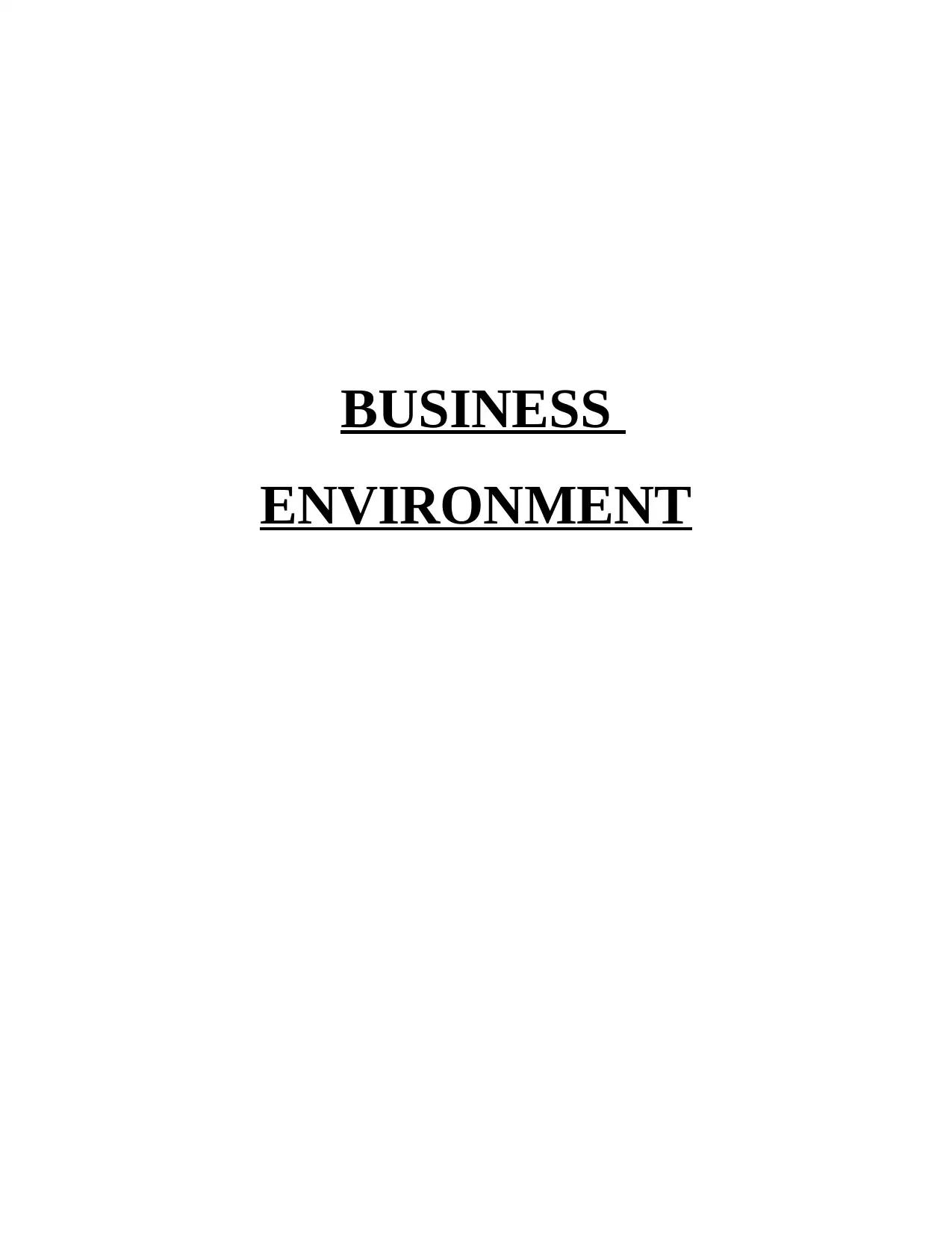
BUSINESS
ENVIRONMENT
ENVIRONMENT
Paraphrase This Document
Need a fresh take? Get an instant paraphrase of this document with our AI Paraphraser
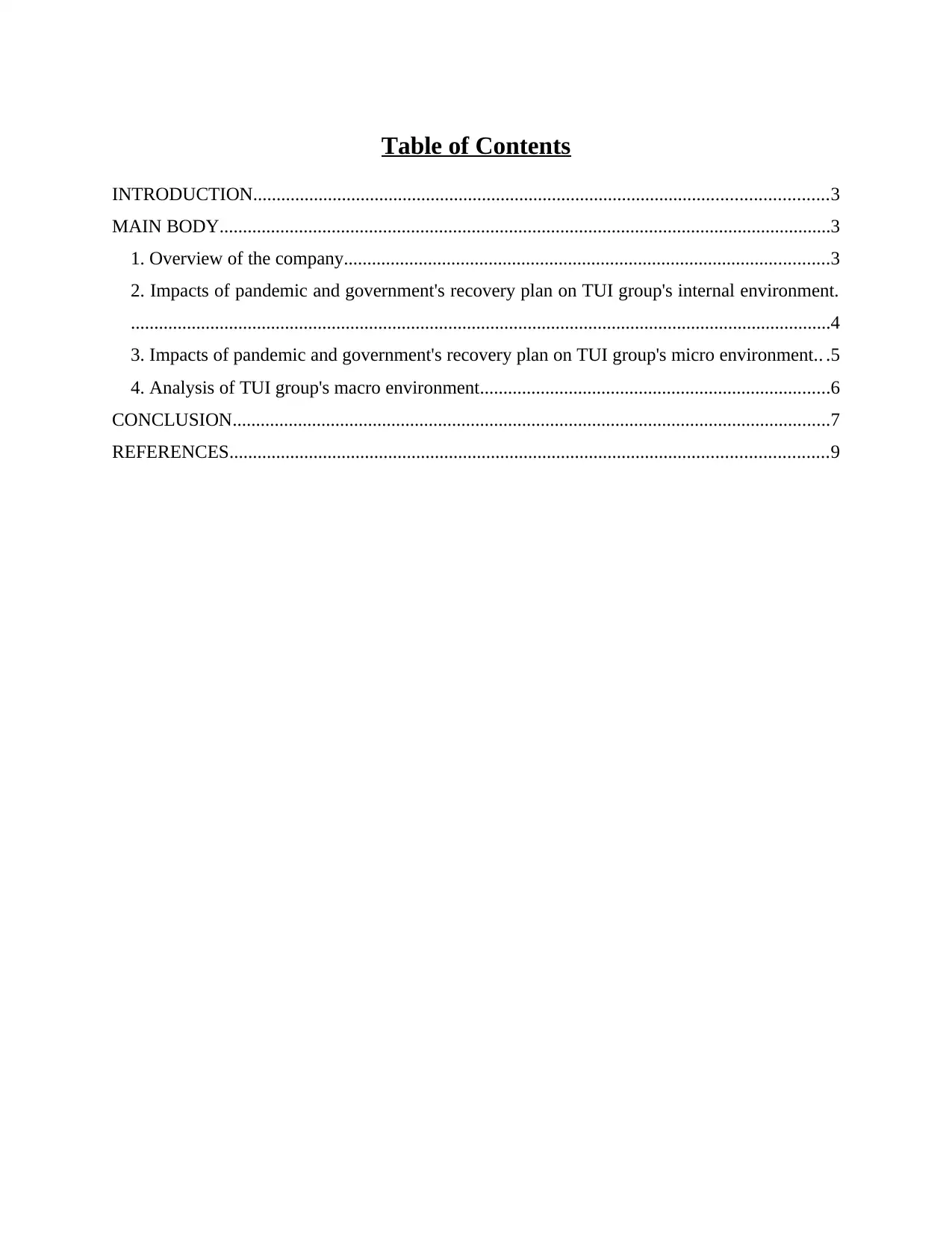
Table of Contents
INTRODUCTION...........................................................................................................................3
MAIN BODY...................................................................................................................................3
1. Overview of the company........................................................................................................3
2. Impacts of pandemic and government's recovery plan on TUI group's internal environment.
......................................................................................................................................................4
3. Impacts of pandemic and government's recovery plan on TUI group's micro environment.. .5
4. Analysis of TUI group's macro environment...........................................................................6
CONCLUSION................................................................................................................................7
REFERENCES................................................................................................................................9
INTRODUCTION...........................................................................................................................3
MAIN BODY...................................................................................................................................3
1. Overview of the company........................................................................................................3
2. Impacts of pandemic and government's recovery plan on TUI group's internal environment.
......................................................................................................................................................4
3. Impacts of pandemic and government's recovery plan on TUI group's micro environment.. .5
4. Analysis of TUI group's macro environment...........................................................................6
CONCLUSION................................................................................................................................7
REFERENCES................................................................................................................................9
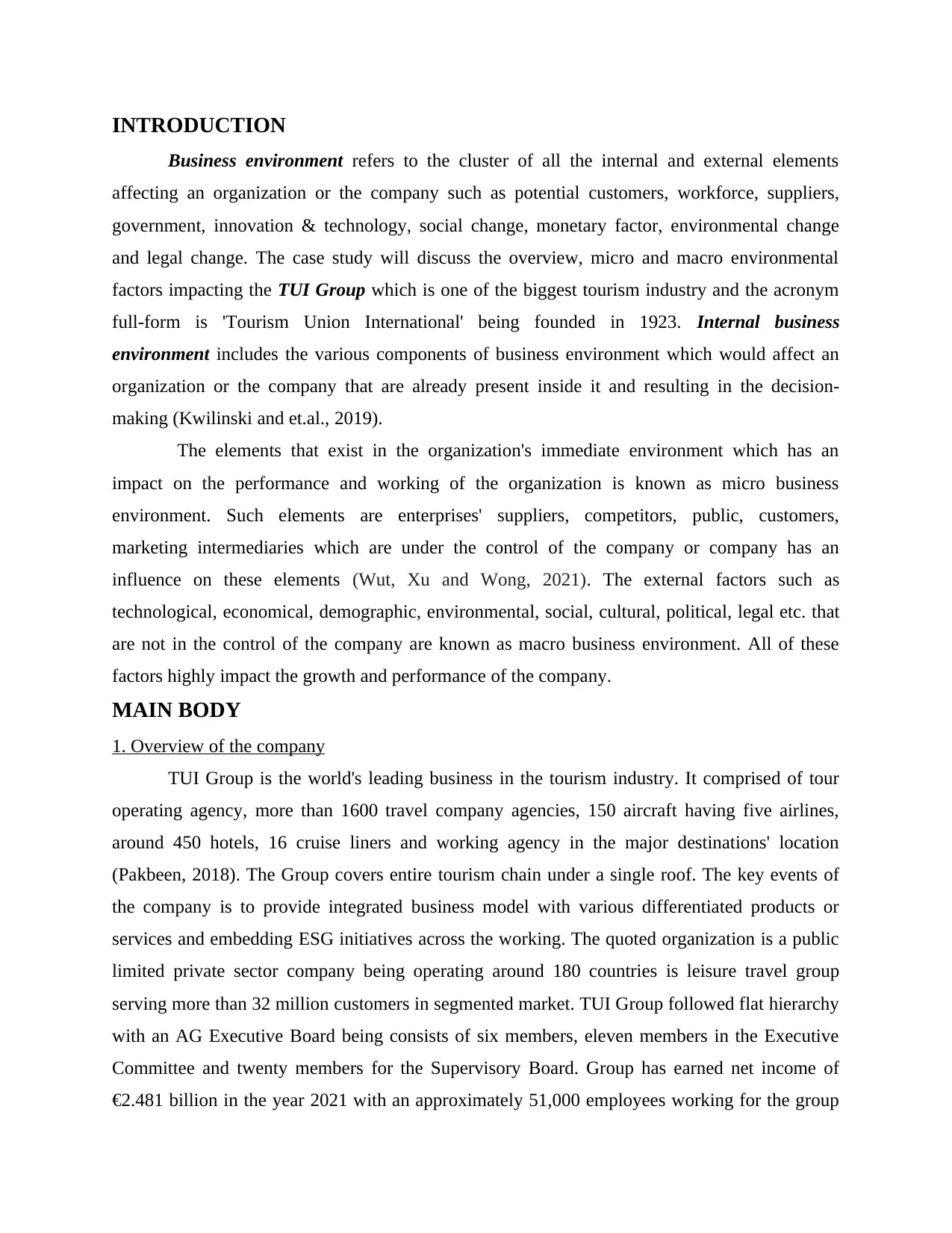
INTRODUCTION
Business environment refers to the cluster of all the internal and external elements
affecting an organization or the company such as potential customers, workforce, suppliers,
government, innovation & technology, social change, monetary factor, environmental change
and legal change. The case study will discuss the overview, micro and macro environmental
factors impacting the TUI Group which is one of the biggest tourism industry and the acronym
full-form is 'Tourism Union International' being founded in 1923. Internal business
environment includes the various components of business environment which would affect an
organization or the company that are already present inside it and resulting in the decision-
making (Kwilinski and et.al., 2019).
The elements that exist in the organization's immediate environment which has an
impact on the performance and working of the organization is known as micro business
environment. Such elements are enterprises' suppliers, competitors, public, customers,
marketing intermediaries which are under the control of the company or company has an
influence on these elements (Wut, Xu and Wong, 2021). The external factors such as
technological, economical, demographic, environmental, social, cultural, political, legal etc. that
are not in the control of the company are known as macro business environment. All of these
factors highly impact the growth and performance of the company.
MAIN BODY
1. Overview of the company
TUI Group is the world's leading business in the tourism industry. It comprised of tour
operating agency, more than 1600 travel company agencies, 150 aircraft having five airlines,
around 450 hotels, 16 cruise liners and working agency in the major destinations' location
(Pakbeen, 2018). The Group covers entire tourism chain under a single roof. The key events of
the company is to provide integrated business model with various differentiated products or
services and embedding ESG initiatives across the working. The quoted organization is a public
limited private sector company being operating around 180 countries is leisure travel group
serving more than 32 million customers in segmented market. TUI Group followed flat hierarchy
with an AG Executive Board being consists of six members, eleven members in the Executive
Committee and twenty members for the Supervisory Board. Group has earned net income of
€2.481 billion in the year 2021 with an approximately 51,000 employees working for the group
Business environment refers to the cluster of all the internal and external elements
affecting an organization or the company such as potential customers, workforce, suppliers,
government, innovation & technology, social change, monetary factor, environmental change
and legal change. The case study will discuss the overview, micro and macro environmental
factors impacting the TUI Group which is one of the biggest tourism industry and the acronym
full-form is 'Tourism Union International' being founded in 1923. Internal business
environment includes the various components of business environment which would affect an
organization or the company that are already present inside it and resulting in the decision-
making (Kwilinski and et.al., 2019).
The elements that exist in the organization's immediate environment which has an
impact on the performance and working of the organization is known as micro business
environment. Such elements are enterprises' suppliers, competitors, public, customers,
marketing intermediaries which are under the control of the company or company has an
influence on these elements (Wut, Xu and Wong, 2021). The external factors such as
technological, economical, demographic, environmental, social, cultural, political, legal etc. that
are not in the control of the company are known as macro business environment. All of these
factors highly impact the growth and performance of the company.
MAIN BODY
1. Overview of the company
TUI Group is the world's leading business in the tourism industry. It comprised of tour
operating agency, more than 1600 travel company agencies, 150 aircraft having five airlines,
around 450 hotels, 16 cruise liners and working agency in the major destinations' location
(Pakbeen, 2018). The Group covers entire tourism chain under a single roof. The key events of
the company is to provide integrated business model with various differentiated products or
services and embedding ESG initiatives across the working. The quoted organization is a public
limited private sector company being operating around 180 countries is leisure travel group
serving more than 32 million customers in segmented market. TUI Group followed flat hierarchy
with an AG Executive Board being consists of six members, eleven members in the Executive
Committee and twenty members for the Supervisory Board. Group has earned net income of
€2.481 billion in the year 2021 with an approximately 51,000 employees working for the group
⊘ This is a preview!⊘
Do you want full access?
Subscribe today to unlock all pages.

Trusted by 1+ million students worldwide
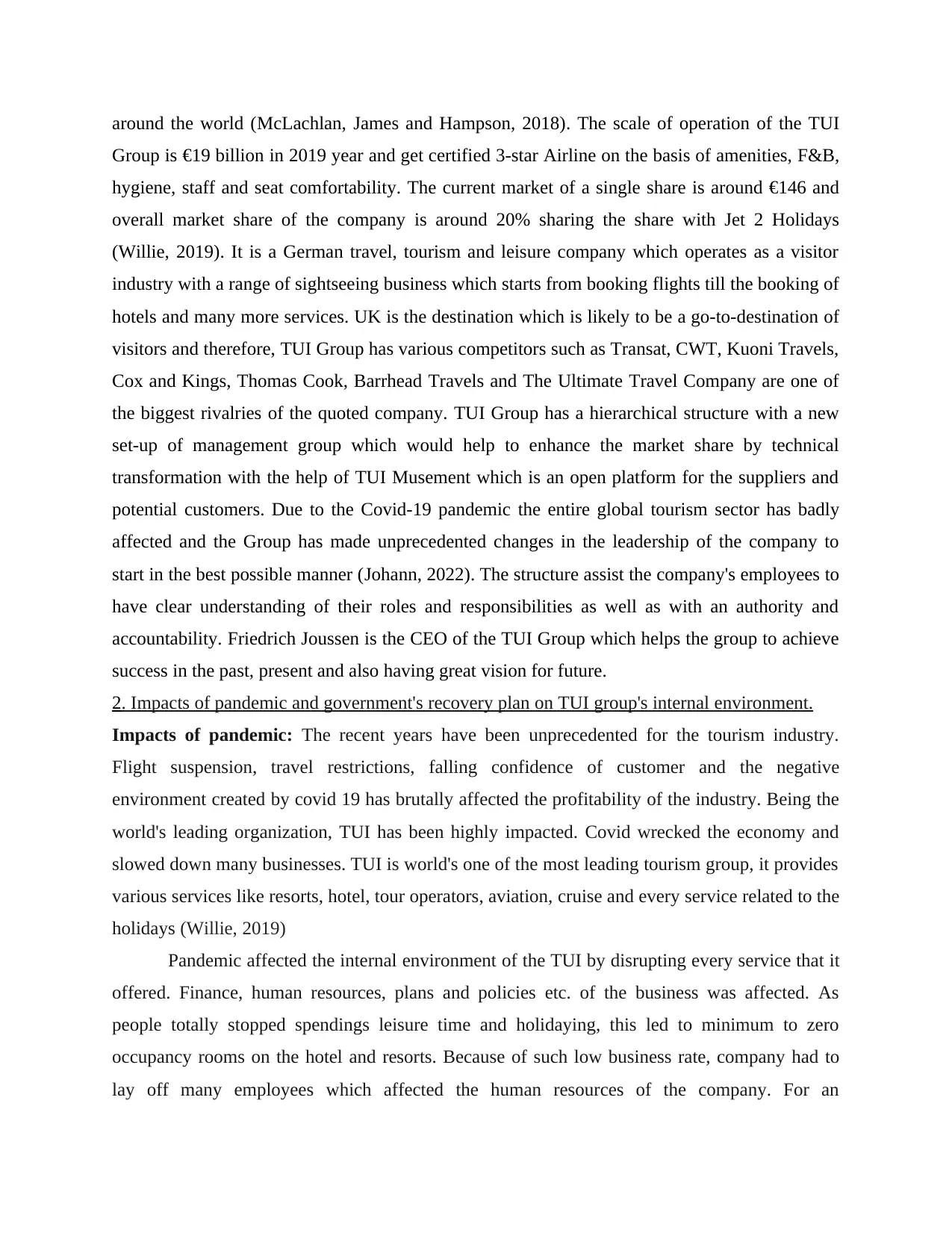
around the world (McLachlan, James and Hampson, 2018). The scale of operation of the TUI
Group is €19 billion in 2019 year and get certified 3-star Airline on the basis of amenities, F&B,
hygiene, staff and seat comfortability. The current market of a single share is around €146 and
overall market share of the company is around 20% sharing the share with Jet 2 Holidays
(Willie, 2019). It is a German travel, tourism and leisure company which operates as a visitor
industry with a range of sightseeing business which starts from booking flights till the booking of
hotels and many more services. UK is the destination which is likely to be a go-to-destination of
visitors and therefore, TUI Group has various competitors such as Transat, CWT, Kuoni Travels,
Cox and Kings, Thomas Cook, Barrhead Travels and The Ultimate Travel Company are one of
the biggest rivalries of the quoted company. TUI Group has a hierarchical structure with a new
set-up of management group which would help to enhance the market share by technical
transformation with the help of TUI Musement which is an open platform for the suppliers and
potential customers. Due to the Covid-19 pandemic the entire global tourism sector has badly
affected and the Group has made unprecedented changes in the leadership of the company to
start in the best possible manner (Johann, 2022). The structure assist the company's employees to
have clear understanding of their roles and responsibilities as well as with an authority and
accountability. Friedrich Joussen is the CEO of the TUI Group which helps the group to achieve
success in the past, present and also having great vision for future.
2. Impacts of pandemic and government's recovery plan on TUI group's internal environment.
Impacts of pandemic: The recent years have been unprecedented for the tourism industry.
Flight suspension, travel restrictions, falling confidence of customer and the negative
environment created by covid 19 has brutally affected the profitability of the industry. Being the
world's leading organization, TUI has been highly impacted. Covid wrecked the economy and
slowed down many businesses. TUI is world's one of the most leading tourism group, it provides
various services like resorts, hotel, tour operators, aviation, cruise and every service related to the
holidays (Willie, 2019)
Pandemic affected the internal environment of the TUI by disrupting every service that it
offered. Finance, human resources, plans and policies etc. of the business was affected. As
people totally stopped spendings leisure time and holidaying, this led to minimum to zero
occupancy rooms on the hotel and resorts. Because of such low business rate, company had to
lay off many employees which affected the human resources of the company. For an
Group is €19 billion in 2019 year and get certified 3-star Airline on the basis of amenities, F&B,
hygiene, staff and seat comfortability. The current market of a single share is around €146 and
overall market share of the company is around 20% sharing the share with Jet 2 Holidays
(Willie, 2019). It is a German travel, tourism and leisure company which operates as a visitor
industry with a range of sightseeing business which starts from booking flights till the booking of
hotels and many more services. UK is the destination which is likely to be a go-to-destination of
visitors and therefore, TUI Group has various competitors such as Transat, CWT, Kuoni Travels,
Cox and Kings, Thomas Cook, Barrhead Travels and The Ultimate Travel Company are one of
the biggest rivalries of the quoted company. TUI Group has a hierarchical structure with a new
set-up of management group which would help to enhance the market share by technical
transformation with the help of TUI Musement which is an open platform for the suppliers and
potential customers. Due to the Covid-19 pandemic the entire global tourism sector has badly
affected and the Group has made unprecedented changes in the leadership of the company to
start in the best possible manner (Johann, 2022). The structure assist the company's employees to
have clear understanding of their roles and responsibilities as well as with an authority and
accountability. Friedrich Joussen is the CEO of the TUI Group which helps the group to achieve
success in the past, present and also having great vision for future.
2. Impacts of pandemic and government's recovery plan on TUI group's internal environment.
Impacts of pandemic: The recent years have been unprecedented for the tourism industry.
Flight suspension, travel restrictions, falling confidence of customer and the negative
environment created by covid 19 has brutally affected the profitability of the industry. Being the
world's leading organization, TUI has been highly impacted. Covid wrecked the economy and
slowed down many businesses. TUI is world's one of the most leading tourism group, it provides
various services like resorts, hotel, tour operators, aviation, cruise and every service related to the
holidays (Willie, 2019)
Pandemic affected the internal environment of the TUI by disrupting every service that it
offered. Finance, human resources, plans and policies etc. of the business was affected. As
people totally stopped spendings leisure time and holidaying, this led to minimum to zero
occupancy rooms on the hotel and resorts. Because of such low business rate, company had to
lay off many employees which affected the human resources of the company. For an
Paraphrase This Document
Need a fresh take? Get an instant paraphrase of this document with our AI Paraphraser
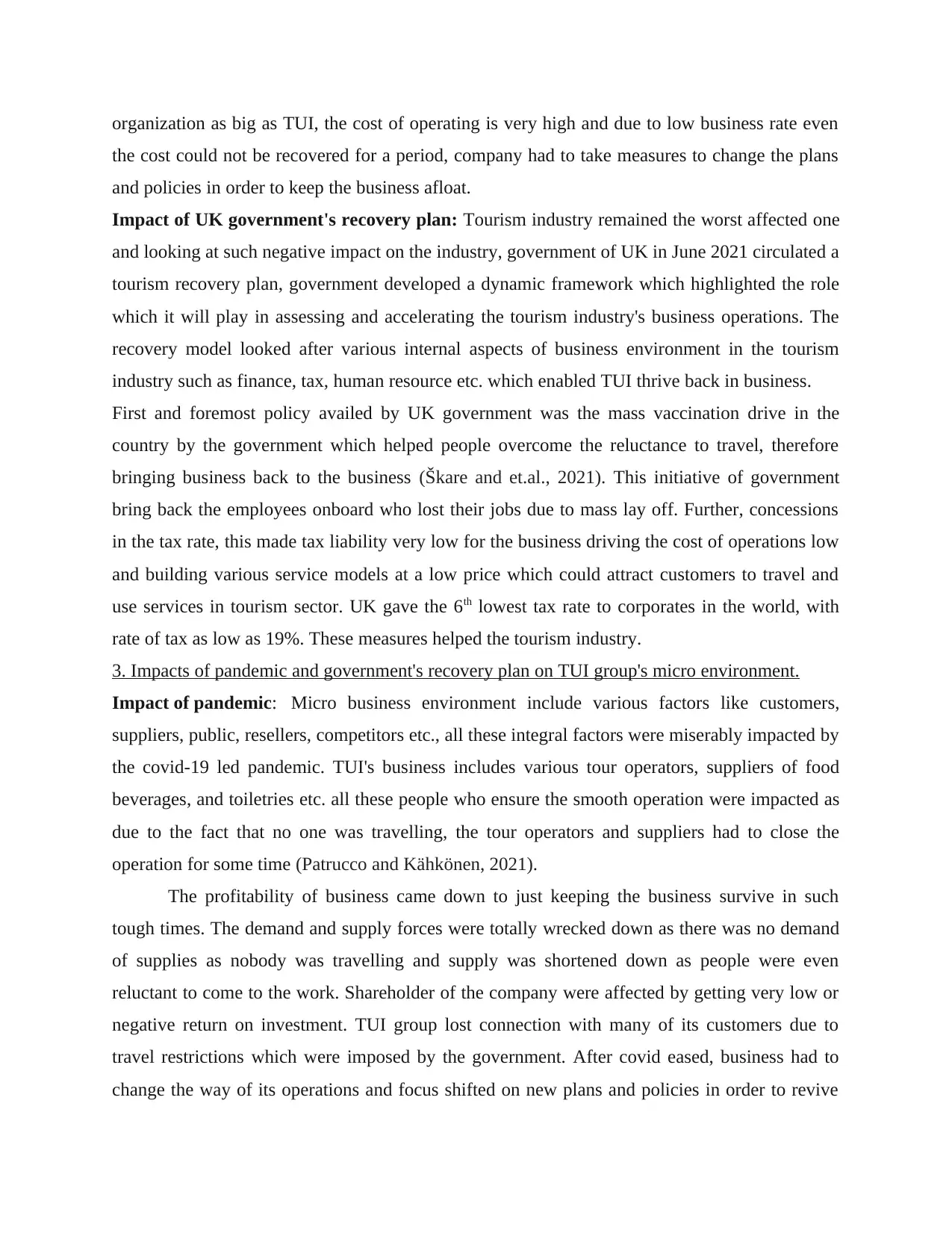
organization as big as TUI, the cost of operating is very high and due to low business rate even
the cost could not be recovered for a period, company had to take measures to change the plans
and policies in order to keep the business afloat.
Impact of UK government's recovery plan: Tourism industry remained the worst affected one
and looking at such negative impact on the industry, government of UK in June 2021 circulated a
tourism recovery plan, government developed a dynamic framework which highlighted the role
which it will play in assessing and accelerating the tourism industry's business operations. The
recovery model looked after various internal aspects of business environment in the tourism
industry such as finance, tax, human resource etc. which enabled TUI thrive back in business.
First and foremost policy availed by UK government was the mass vaccination drive in the
country by the government which helped people overcome the reluctance to travel, therefore
bringing business back to the business (Škare and et.al., 2021). This initiative of government
bring back the employees onboard who lost their jobs due to mass lay off. Further, concessions
in the tax rate, this made tax liability very low for the business driving the cost of operations low
and building various service models at a low price which could attract customers to travel and
use services in tourism sector. UK gave the 6th lowest tax rate to corporates in the world, with
rate of tax as low as 19%. These measures helped the tourism industry.
3. Impacts of pandemic and government's recovery plan on TUI group's micro environment.
Impact of pandemic: Micro business environment include various factors like customers,
suppliers, public, resellers, competitors etc., all these integral factors were miserably impacted by
the covid-19 led pandemic. TUI's business includes various tour operators, suppliers of food
beverages, and toiletries etc. all these people who ensure the smooth operation were impacted as
due to the fact that no one was travelling, the tour operators and suppliers had to close the
operation for some time (Patrucco and Kähkönen, 2021).
The profitability of business came down to just keeping the business survive in such
tough times. The demand and supply forces were totally wrecked down as there was no demand
of supplies as nobody was travelling and supply was shortened down as people were even
reluctant to come to the work. Shareholder of the company were affected by getting very low or
negative return on investment. TUI group lost connection with many of its customers due to
travel restrictions which were imposed by the government. After covid eased, business had to
change the way of its operations and focus shifted on new plans and policies in order to revive
the cost could not be recovered for a period, company had to take measures to change the plans
and policies in order to keep the business afloat.
Impact of UK government's recovery plan: Tourism industry remained the worst affected one
and looking at such negative impact on the industry, government of UK in June 2021 circulated a
tourism recovery plan, government developed a dynamic framework which highlighted the role
which it will play in assessing and accelerating the tourism industry's business operations. The
recovery model looked after various internal aspects of business environment in the tourism
industry such as finance, tax, human resource etc. which enabled TUI thrive back in business.
First and foremost policy availed by UK government was the mass vaccination drive in the
country by the government which helped people overcome the reluctance to travel, therefore
bringing business back to the business (Škare and et.al., 2021). This initiative of government
bring back the employees onboard who lost their jobs due to mass lay off. Further, concessions
in the tax rate, this made tax liability very low for the business driving the cost of operations low
and building various service models at a low price which could attract customers to travel and
use services in tourism sector. UK gave the 6th lowest tax rate to corporates in the world, with
rate of tax as low as 19%. These measures helped the tourism industry.
3. Impacts of pandemic and government's recovery plan on TUI group's micro environment.
Impact of pandemic: Micro business environment include various factors like customers,
suppliers, public, resellers, competitors etc., all these integral factors were miserably impacted by
the covid-19 led pandemic. TUI's business includes various tour operators, suppliers of food
beverages, and toiletries etc. all these people who ensure the smooth operation were impacted as
due to the fact that no one was travelling, the tour operators and suppliers had to close the
operation for some time (Patrucco and Kähkönen, 2021).
The profitability of business came down to just keeping the business survive in such
tough times. The demand and supply forces were totally wrecked down as there was no demand
of supplies as nobody was travelling and supply was shortened down as people were even
reluctant to come to the work. Shareholder of the company were affected by getting very low or
negative return on investment. TUI group lost connection with many of its customers due to
travel restrictions which were imposed by the government. After covid eased, business had to
change the way of its operations and focus shifted on new plans and policies in order to revive
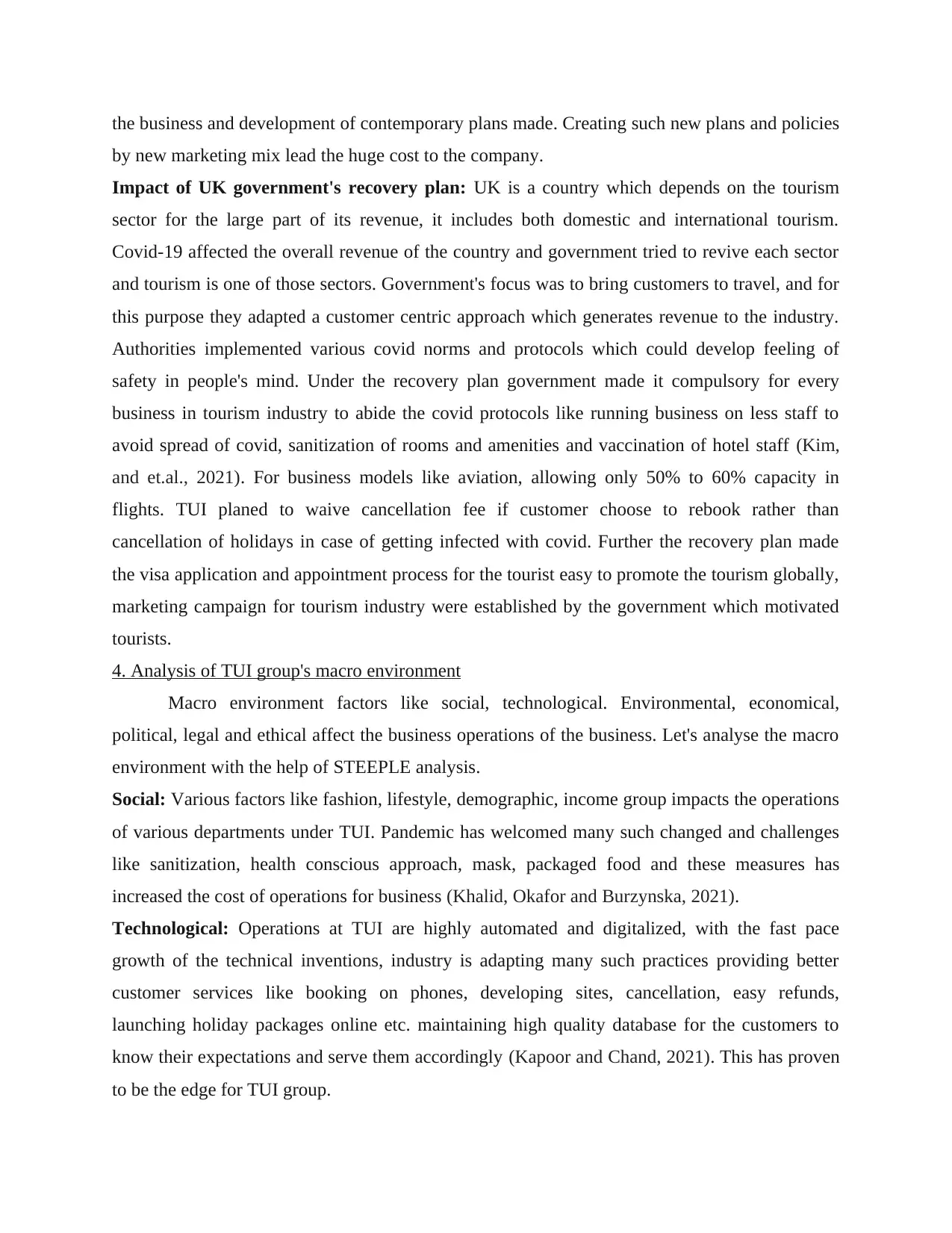
the business and development of contemporary plans made. Creating such new plans and policies
by new marketing mix lead the huge cost to the company.
Impact of UK government's recovery plan: UK is a country which depends on the tourism
sector for the large part of its revenue, it includes both domestic and international tourism.
Covid-19 affected the overall revenue of the country and government tried to revive each sector
and tourism is one of those sectors. Government's focus was to bring customers to travel, and for
this purpose they adapted a customer centric approach which generates revenue to the industry.
Authorities implemented various covid norms and protocols which could develop feeling of
safety in people's mind. Under the recovery plan government made it compulsory for every
business in tourism industry to abide the covid protocols like running business on less staff to
avoid spread of covid, sanitization of rooms and amenities and vaccination of hotel staff (Kim,
and et.al., 2021). For business models like aviation, allowing only 50% to 60% capacity in
flights. TUI planed to waive cancellation fee if customer choose to rebook rather than
cancellation of holidays in case of getting infected with covid. Further the recovery plan made
the visa application and appointment process for the tourist easy to promote the tourism globally,
marketing campaign for tourism industry were established by the government which motivated
tourists.
4. Analysis of TUI group's macro environment
Macro environment factors like social, technological. Environmental, economical,
political, legal and ethical affect the business operations of the business. Let's analyse the macro
environment with the help of STEEPLE analysis.
Social: Various factors like fashion, lifestyle, demographic, income group impacts the operations
of various departments under TUI. Pandemic has welcomed many such changed and challenges
like sanitization, health conscious approach, mask, packaged food and these measures has
increased the cost of operations for business (Khalid, Okafor and Burzynska, 2021).
Technological: Operations at TUI are highly automated and digitalized, with the fast pace
growth of the technical inventions, industry is adapting many such practices providing better
customer services like booking on phones, developing sites, cancellation, easy refunds,
launching holiday packages online etc. maintaining high quality database for the customers to
know their expectations and serve them accordingly (Kapoor and Chand, 2021). This has proven
to be the edge for TUI group.
by new marketing mix lead the huge cost to the company.
Impact of UK government's recovery plan: UK is a country which depends on the tourism
sector for the large part of its revenue, it includes both domestic and international tourism.
Covid-19 affected the overall revenue of the country and government tried to revive each sector
and tourism is one of those sectors. Government's focus was to bring customers to travel, and for
this purpose they adapted a customer centric approach which generates revenue to the industry.
Authorities implemented various covid norms and protocols which could develop feeling of
safety in people's mind. Under the recovery plan government made it compulsory for every
business in tourism industry to abide the covid protocols like running business on less staff to
avoid spread of covid, sanitization of rooms and amenities and vaccination of hotel staff (Kim,
and et.al., 2021). For business models like aviation, allowing only 50% to 60% capacity in
flights. TUI planed to waive cancellation fee if customer choose to rebook rather than
cancellation of holidays in case of getting infected with covid. Further the recovery plan made
the visa application and appointment process for the tourist easy to promote the tourism globally,
marketing campaign for tourism industry were established by the government which motivated
tourists.
4. Analysis of TUI group's macro environment
Macro environment factors like social, technological. Environmental, economical,
political, legal and ethical affect the business operations of the business. Let's analyse the macro
environment with the help of STEEPLE analysis.
Social: Various factors like fashion, lifestyle, demographic, income group impacts the operations
of various departments under TUI. Pandemic has welcomed many such changed and challenges
like sanitization, health conscious approach, mask, packaged food and these measures has
increased the cost of operations for business (Khalid, Okafor and Burzynska, 2021).
Technological: Operations at TUI are highly automated and digitalized, with the fast pace
growth of the technical inventions, industry is adapting many such practices providing better
customer services like booking on phones, developing sites, cancellation, easy refunds,
launching holiday packages online etc. maintaining high quality database for the customers to
know their expectations and serve them accordingly (Kapoor and Chand, 2021). This has proven
to be the edge for TUI group.
⊘ This is a preview!⊘
Do you want full access?
Subscribe today to unlock all pages.

Trusted by 1+ million students worldwide
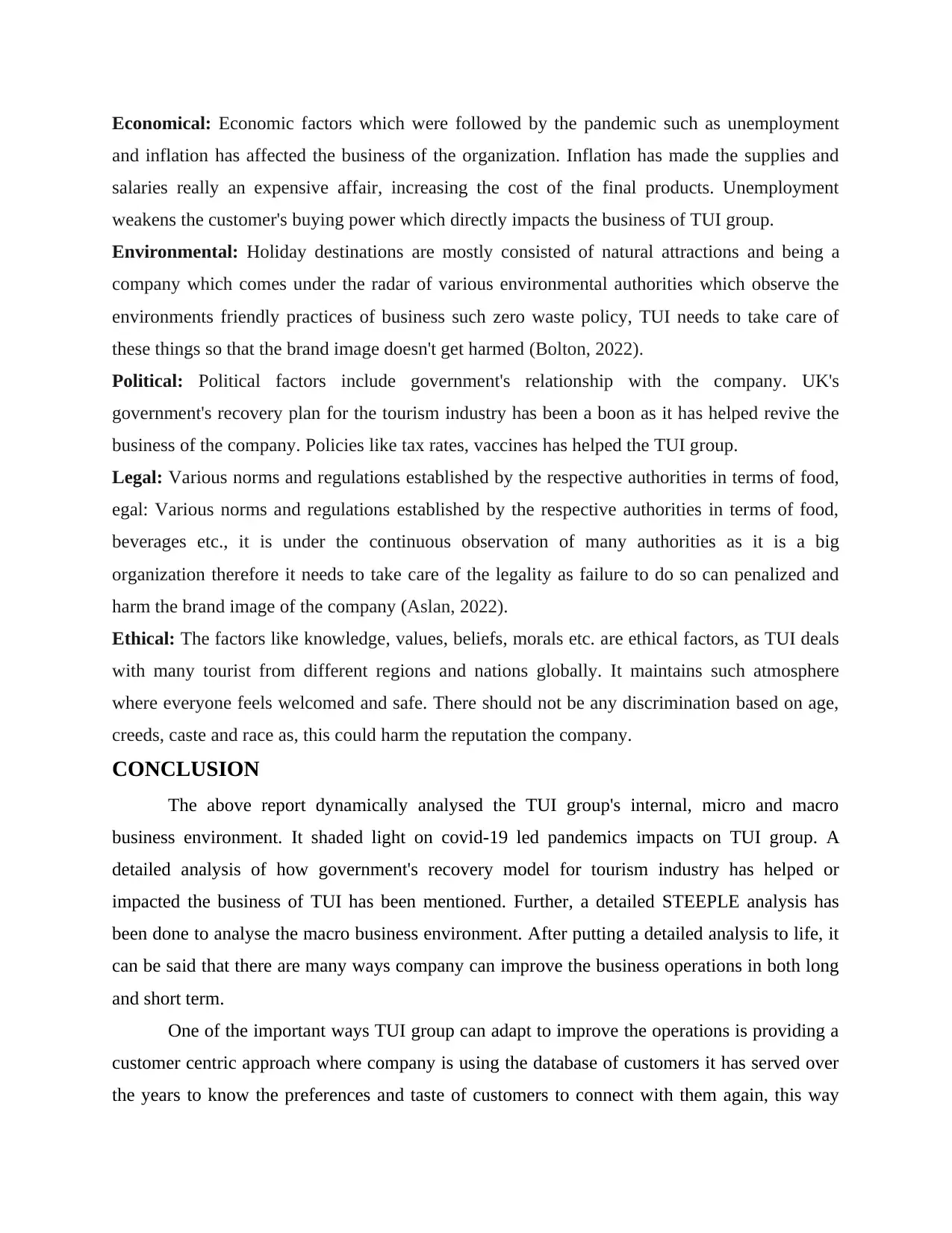
Economical: Economic factors which were followed by the pandemic such as unemployment
and inflation has affected the business of the organization. Inflation has made the supplies and
salaries really an expensive affair, increasing the cost of the final products. Unemployment
weakens the customer's buying power which directly impacts the business of TUI group.
Environmental: Holiday destinations are mostly consisted of natural attractions and being a
company which comes under the radar of various environmental authorities which observe the
environments friendly practices of business such zero waste policy, TUI needs to take care of
these things so that the brand image doesn't get harmed (Bolton, 2022).
Political: Political factors include government's relationship with the company. UK's
government's recovery plan for the tourism industry has been a boon as it has helped revive the
business of the company. Policies like tax rates, vaccines has helped the TUI group.
Legal: Various norms and regulations established by the respective authorities in terms of food,
egal: Various norms and regulations established by the respective authorities in terms of food,
beverages etc., it is under the continuous observation of many authorities as it is a big
organization therefore it needs to take care of the legality as failure to do so can penalized and
harm the brand image of the company (Aslan, 2022).
Ethical: The factors like knowledge, values, beliefs, morals etc. are ethical factors, as TUI deals
with many tourist from different regions and nations globally. It maintains such atmosphere
where everyone feels welcomed and safe. There should not be any discrimination based on age,
creeds, caste and race as, this could harm the reputation the company.
CONCLUSION
The above report dynamically analysed the TUI group's internal, micro and macro
business environment. It shaded light on covid-19 led pandemics impacts on TUI group. A
detailed analysis of how government's recovery model for tourism industry has helped or
impacted the business of TUI has been mentioned. Further, a detailed STEEPLE analysis has
been done to analyse the macro business environment. After putting a detailed analysis to life, it
can be said that there are many ways company can improve the business operations in both long
and short term.
One of the important ways TUI group can adapt to improve the operations is providing a
customer centric approach where company is using the database of customers it has served over
the years to know the preferences and taste of customers to connect with them again, this way
and inflation has affected the business of the organization. Inflation has made the supplies and
salaries really an expensive affair, increasing the cost of the final products. Unemployment
weakens the customer's buying power which directly impacts the business of TUI group.
Environmental: Holiday destinations are mostly consisted of natural attractions and being a
company which comes under the radar of various environmental authorities which observe the
environments friendly practices of business such zero waste policy, TUI needs to take care of
these things so that the brand image doesn't get harmed (Bolton, 2022).
Political: Political factors include government's relationship with the company. UK's
government's recovery plan for the tourism industry has been a boon as it has helped revive the
business of the company. Policies like tax rates, vaccines has helped the TUI group.
Legal: Various norms and regulations established by the respective authorities in terms of food,
egal: Various norms and regulations established by the respective authorities in terms of food,
beverages etc., it is under the continuous observation of many authorities as it is a big
organization therefore it needs to take care of the legality as failure to do so can penalized and
harm the brand image of the company (Aslan, 2022).
Ethical: The factors like knowledge, values, beliefs, morals etc. are ethical factors, as TUI deals
with many tourist from different regions and nations globally. It maintains such atmosphere
where everyone feels welcomed and safe. There should not be any discrimination based on age,
creeds, caste and race as, this could harm the reputation the company.
CONCLUSION
The above report dynamically analysed the TUI group's internal, micro and macro
business environment. It shaded light on covid-19 led pandemics impacts on TUI group. A
detailed analysis of how government's recovery model for tourism industry has helped or
impacted the business of TUI has been mentioned. Further, a detailed STEEPLE analysis has
been done to analyse the macro business environment. After putting a detailed analysis to life, it
can be said that there are many ways company can improve the business operations in both long
and short term.
One of the important ways TUI group can adapt to improve the operations is providing a
customer centric approach where company is using the database of customers it has served over
the years to know the preferences and taste of customers to connect with them again, this way
Paraphrase This Document
Need a fresh take? Get an instant paraphrase of this document with our AI Paraphraser
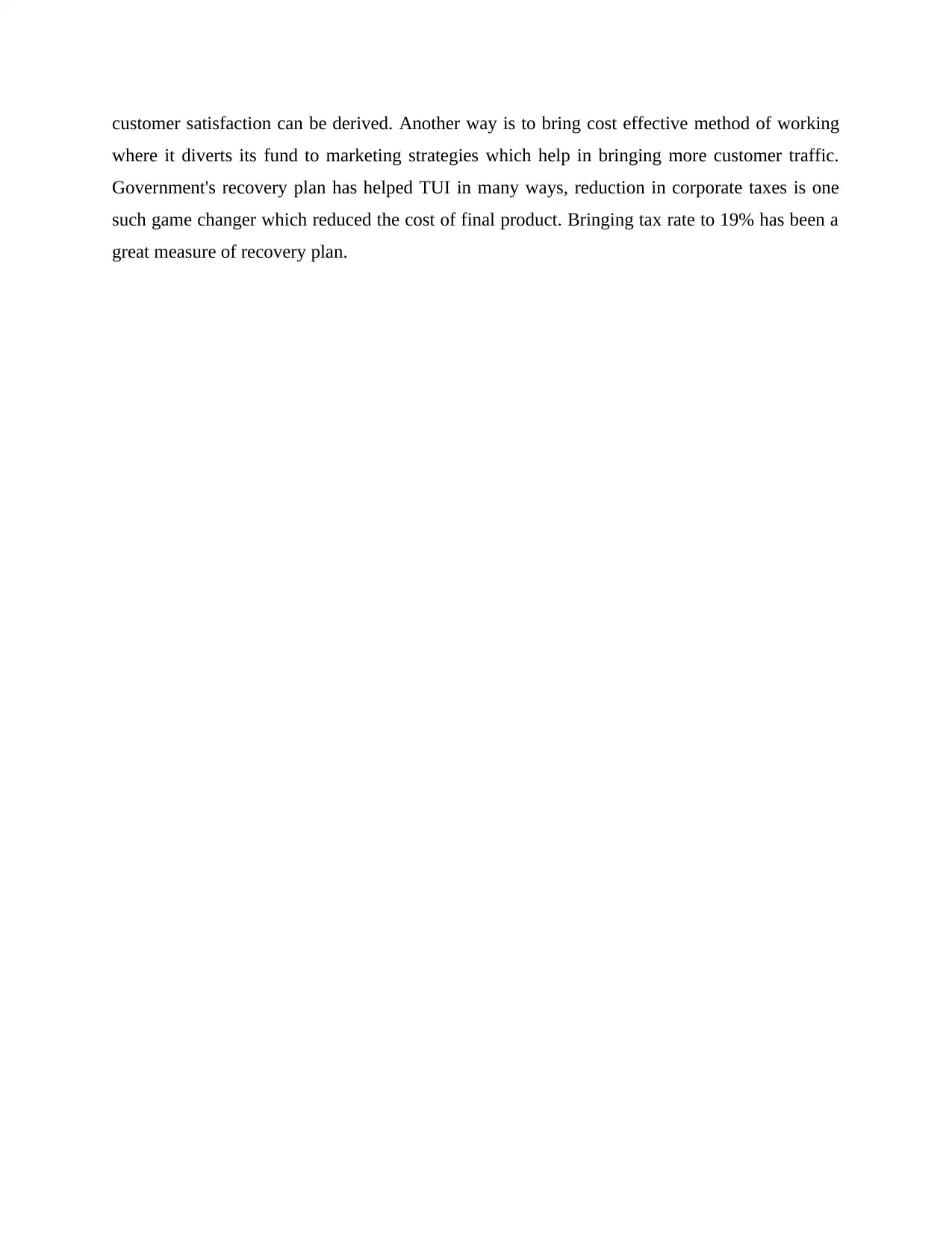
customer satisfaction can be derived. Another way is to bring cost effective method of working
where it diverts its fund to marketing strategies which help in bringing more customer traffic.
Government's recovery plan has helped TUI in many ways, reduction in corporate taxes is one
such game changer which reduced the cost of final product. Bringing tax rate to 19% has been a
great measure of recovery plan.
where it diverts its fund to marketing strategies which help in bringing more customer traffic.
Government's recovery plan has helped TUI in many ways, reduction in corporate taxes is one
such game changer which reduced the cost of final product. Bringing tax rate to 19% has been a
great measure of recovery plan.
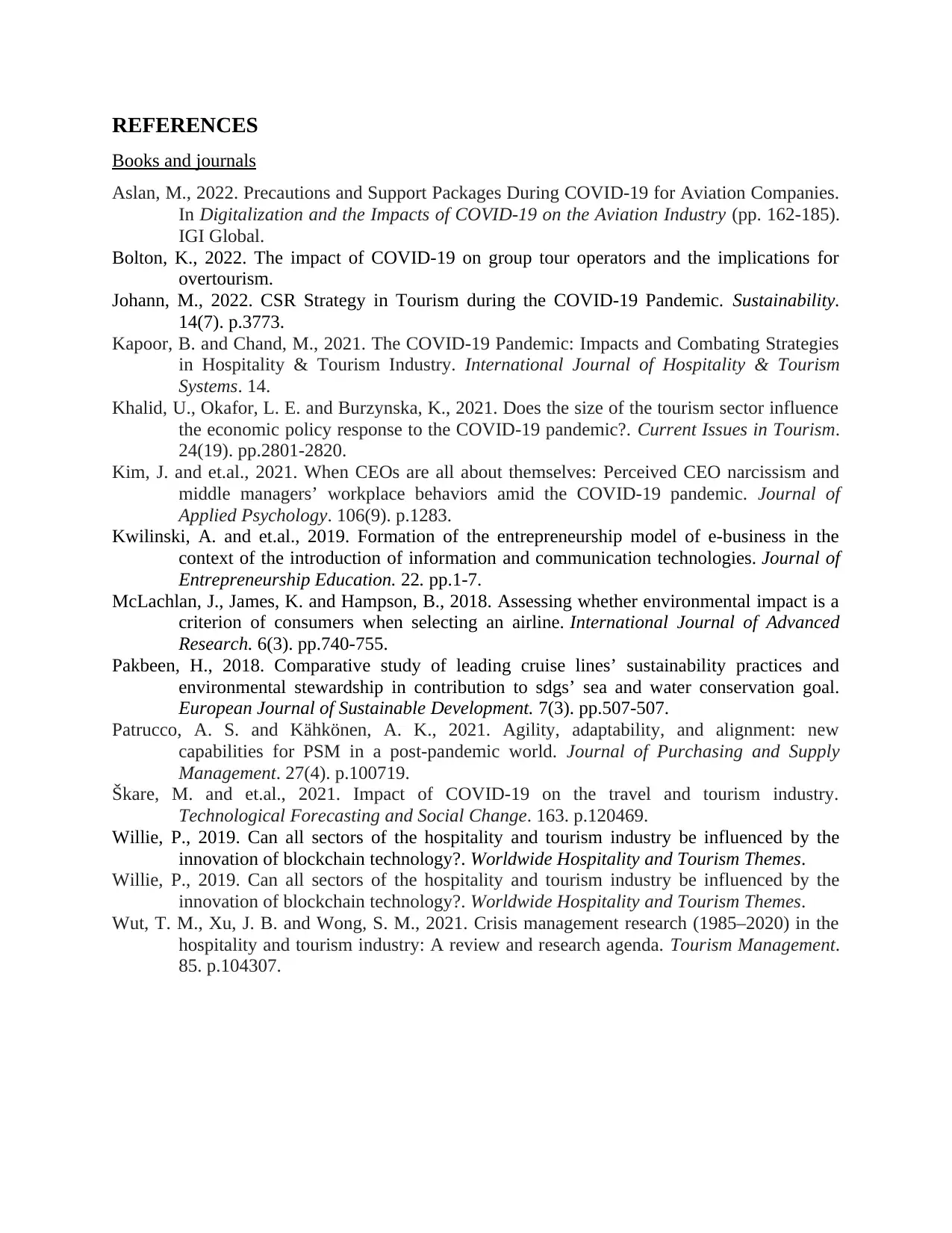
REFERENCES
Books and journals
Aslan, M., 2022. Precautions and Support Packages During COVID-19 for Aviation Companies.
In Digitalization and the Impacts of COVID-19 on the Aviation Industry (pp. 162-185).
IGI Global.
Bolton, K., 2022. The impact of COVID-19 on group tour operators and the implications for
overtourism.
Johann, M., 2022. CSR Strategy in Tourism during the COVID-19 Pandemic. Sustainability.
14(7). p.3773.
Kapoor, B. and Chand, M., 2021. The COVID-19 Pandemic: Impacts and Combating Strategies
in Hospitality & Tourism Industry. International Journal of Hospitality & Tourism
Systems. 14.
Khalid, U., Okafor, L. E. and Burzynska, K., 2021. Does the size of the tourism sector influence
the economic policy response to the COVID-19 pandemic?. Current Issues in Tourism.
24(19). pp.2801-2820.
Kim, J. and et.al., 2021. When CEOs are all about themselves: Perceived CEO narcissism and
middle managers’ workplace behaviors amid the COVID-19 pandemic. Journal of
Applied Psychology. 106(9). p.1283.
Kwilinski, A. and et.al., 2019. Formation of the entrepreneurship model of e-business in the
context of the introduction of information and communication technologies. Journal of
Entrepreneurship Education. 22. pp.1-7.
McLachlan, J., James, K. and Hampson, B., 2018. Assessing whether environmental impact is a
criterion of consumers when selecting an airline. International Journal of Advanced
Research. 6(3). pp.740-755.
Pakbeen, H., 2018. Comparative study of leading cruise lines’ sustainability practices and
environmental stewardship in contribution to sdgs’ sea and water conservation goal.
European Journal of Sustainable Development. 7(3). pp.507-507.
Patrucco, A. S. and Kähkönen, A. K., 2021. Agility, adaptability, and alignment: new
capabilities for PSM in a post-pandemic world. Journal of Purchasing and Supply
Management. 27(4). p.100719.
Škare, M. and et.al., 2021. Impact of COVID-19 on the travel and tourism industry.
Technological Forecasting and Social Change. 163. p.120469.
Willie, P., 2019. Can all sectors of the hospitality and tourism industry be influenced by the
innovation of blockchain technology?. Worldwide Hospitality and Tourism Themes.
Willie, P., 2019. Can all sectors of the hospitality and tourism industry be influenced by the
innovation of blockchain technology?. Worldwide Hospitality and Tourism Themes.
Wut, T. M., Xu, J. B. and Wong, S. M., 2021. Crisis management research (1985–2020) in the
hospitality and tourism industry: A review and research agenda. Tourism Management.
85. p.104307.
Books and journals
Aslan, M., 2022. Precautions and Support Packages During COVID-19 for Aviation Companies.
In Digitalization and the Impacts of COVID-19 on the Aviation Industry (pp. 162-185).
IGI Global.
Bolton, K., 2022. The impact of COVID-19 on group tour operators and the implications for
overtourism.
Johann, M., 2022. CSR Strategy in Tourism during the COVID-19 Pandemic. Sustainability.
14(7). p.3773.
Kapoor, B. and Chand, M., 2021. The COVID-19 Pandemic: Impacts and Combating Strategies
in Hospitality & Tourism Industry. International Journal of Hospitality & Tourism
Systems. 14.
Khalid, U., Okafor, L. E. and Burzynska, K., 2021. Does the size of the tourism sector influence
the economic policy response to the COVID-19 pandemic?. Current Issues in Tourism.
24(19). pp.2801-2820.
Kim, J. and et.al., 2021. When CEOs are all about themselves: Perceived CEO narcissism and
middle managers’ workplace behaviors amid the COVID-19 pandemic. Journal of
Applied Psychology. 106(9). p.1283.
Kwilinski, A. and et.al., 2019. Formation of the entrepreneurship model of e-business in the
context of the introduction of information and communication technologies. Journal of
Entrepreneurship Education. 22. pp.1-7.
McLachlan, J., James, K. and Hampson, B., 2018. Assessing whether environmental impact is a
criterion of consumers when selecting an airline. International Journal of Advanced
Research. 6(3). pp.740-755.
Pakbeen, H., 2018. Comparative study of leading cruise lines’ sustainability practices and
environmental stewardship in contribution to sdgs’ sea and water conservation goal.
European Journal of Sustainable Development. 7(3). pp.507-507.
Patrucco, A. S. and Kähkönen, A. K., 2021. Agility, adaptability, and alignment: new
capabilities for PSM in a post-pandemic world. Journal of Purchasing and Supply
Management. 27(4). p.100719.
Škare, M. and et.al., 2021. Impact of COVID-19 on the travel and tourism industry.
Technological Forecasting and Social Change. 163. p.120469.
Willie, P., 2019. Can all sectors of the hospitality and tourism industry be influenced by the
innovation of blockchain technology?. Worldwide Hospitality and Tourism Themes.
Willie, P., 2019. Can all sectors of the hospitality and tourism industry be influenced by the
innovation of blockchain technology?. Worldwide Hospitality and Tourism Themes.
Wut, T. M., Xu, J. B. and Wong, S. M., 2021. Crisis management research (1985–2020) in the
hospitality and tourism industry: A review and research agenda. Tourism Management.
85. p.104307.
⊘ This is a preview!⊘
Do you want full access?
Subscribe today to unlock all pages.

Trusted by 1+ million students worldwide

1 out of 10
Related Documents
Your All-in-One AI-Powered Toolkit for Academic Success.
+13062052269
info@desklib.com
Available 24*7 on WhatsApp / Email
![[object Object]](/_next/static/media/star-bottom.7253800d.svg)
Unlock your academic potential
Copyright © 2020–2026 A2Z Services. All Rights Reserved. Developed and managed by ZUCOL.




